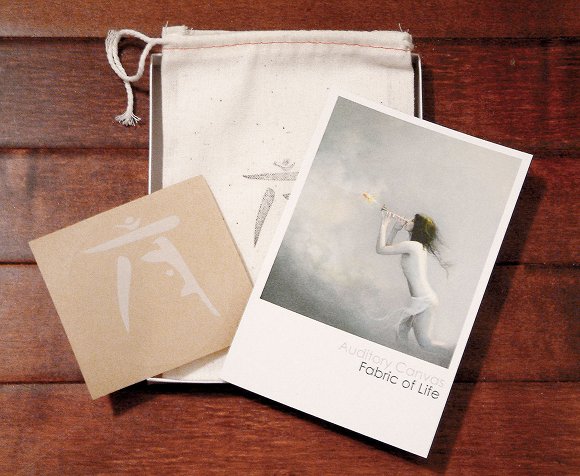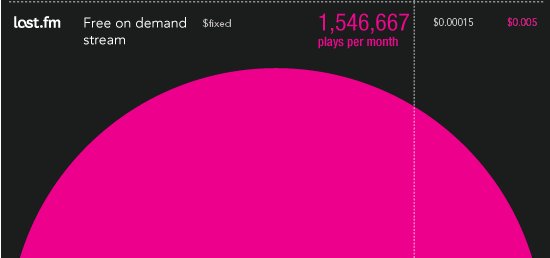
If anyone had listened to the predictions, albums would be irrelevant by now. Instead, finding a way to weave music into a coherent narrative of tracks, and imbuing the object with meaning and value, matters more than ever. Finding time and resources is as much a challenge as ever, but there are some new tools for funding and finding music, even in the age of exploding global population and output.
Auditory Canvas’ record “Fabric of Life” is one of the many gems out there to discover. It’s a sparkling, delicate dreamscape of music, noted by our friend stretta (known for his own lovely music in the monome community). I’m not as fond of the final cuts on the album, personally; the spoken political narrative for me isn’t nearly as evocative as the opening numbers. (It’s nonetheless nice to hear music injected with such a point of view.) But there is a strong sense that creator David of Summer Rain Recordings is traversing a varied and personal musical terrain. It’s the kind of music that could bring you some spring inspiration.
Just as significant, Auditory Canvas made the album possible by crowdsourcing “kickstarter” funding at kickstarter.com. And lest such projects become selfish, by purchasing the album, you generate revenue to go back into the kickstarter system. Album production, after all, is far cheaper than it once was, but it isn’t free. “Fabric of Life” demonstrates what could happen to musical ecology if this kind of micro-lending invested in good, new work. And your purchase becomes a way to turn David into an investor himself in the system, keeping the cycle going.

To make that purchase worthwhile, Auditory Canvas put some thought into the lovely presentation; the limited edition has an almost theatrical approach to packaging, and even comes with a papercraft KORG synth (which I can add to my paper Minimoog from GAS). David writes with a number of talking points:
- Funded via a kickstarter project ( http://www.kickstarter.com/projects/auditorycanvas/be-a-part-of-the-fabric-of-life-album-release-0)
- $1000 from sales going back into other people’s kickstarter projects.
- 10% of sales going to charity (NextAid.org)
- CD packaging produced using recycled plastic, recycled paper, and soy inks
- Released on my own label, Summer Rain Recordings (all artists donate a portion of their royalties to charity, the label matches their donation)
- Limited edition and standard CD and digital available here: http://auditorycanvas.net/store
- Available on all digital retailers 17 May
- More info at: http://auditorycanvas.net or http://summerrainrecordings.net
The interesting thing about the release strategy is, while it does make the album available through digital channels, it provides some big incentives to go straight to the artist. And that kind of self-motivated album release may increasingly become essential. For a stunning visualization of why, look no further than the lovely blog Information is Beautiful. Using data and analysis from The Cynical Musician, it paints a sobering portrait of the harsh realities of digital distribution. Artists would have to get 1.5+ million plays on Last.fm’s streaming service just to make a month’s living wage.

It’s certainly a glass half-empty / half-full situation, though: you’d only need to sell 143 self-pressed CDs. And that should be optimistic: online tools, even those that sell music, are great promotional tools; boutique sales of physical objects (or even of downloads, in situations where the artist gets a bigger cut) are where the revenue is. And even if that doesn’t help you quit your day job, that could be essential in being able to invest in your next record and keep artists productive. (This is also, it seems to me, a great argument for the potential value of torrents and Creative Commons licensing. If the online file is a promotional tool, best to get it far and try to leverage the things that do bring in money than try to get a few extra nickels and dimes.)
It also pretty clearly makes the challenges facing the business of music about format and economies of scale, not piracy (or, at the very least, not piracy alone – not by a long shot, if the “legal” services aren’t generating measurable revenue, either).
HOW MUCH DO MUSIC ARTISTS EARN ONLINE?
Thanks to David for sharing his lovely music. And I expect, whether you’re a great fan of the album or not, this should get some wheels turning about that album you’ve been trying to finish.
